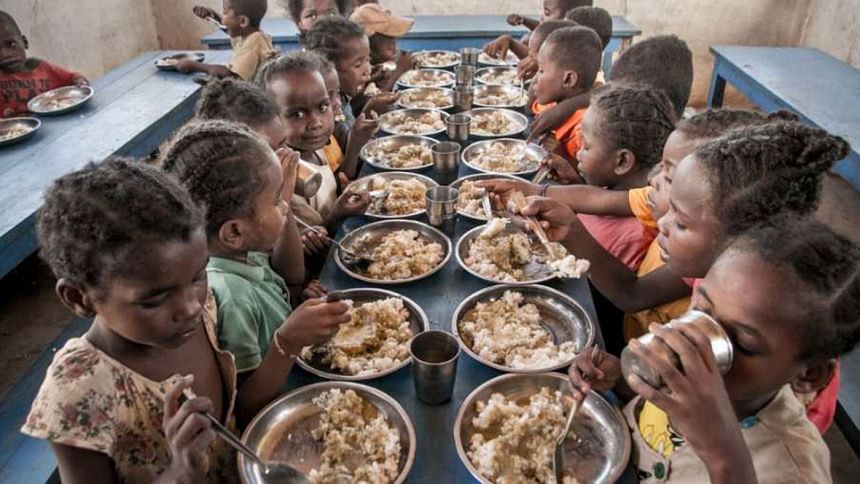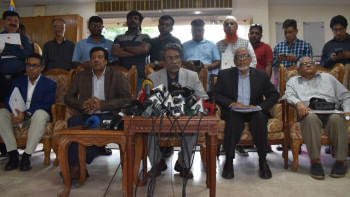A choice between death by COVID-19 or famine

It has been more than a month since the world has been under lockdown because of the COVID-19 pandemic. The number of deaths will soar if the predicted second and third waves and the "biblical" famine—as UN warns—come true.
Are we then racing for a massive humanitarian catastrophe? If so, perhaps future generations will remember the COVID-19 pandemic as the biggest humanitarian catastrophe in human history!
At the beginning of this pandemic, the majority of the victims were elderly. Later the number of younger victims started to mount. Then the "rationing" of the healthcare system was chosen to save healthier and/or younger people who had more chances of recovery.
Healthcare rationing is arguably a painful paradox because of the differences in the boundary of "egalitarian" ethos, and the availability of resources. These are based on fostering the dilemma—if death should/could be delayed. Nonetheless, moral apriority in that "cruel" choice of rationing—a choice between life and death—remains a concern.
In fact, the pandemic has given us a pounding realisation to fathom the depth between life and death. We realised that the COVID-19 death sentence could fall upon any of us at any time. The reality is, we can die at any time with or without COVID-19. Yet we never thought of death as much as we are thinking about it during this pandemic!
By all means, we want to escape an early death sentence from the coronavirus.
Because of the lack of an effective vaccine/drug, lockdown became the best option to escape any unexpected death. To avoid any chances of getting in touch with the deadly virus, suspected COVID-19 patients were found abandoned; ousted COVID-19 patients wandered helplessly; and dead COVID-19 patients were left unattended in old homes, on the street, or even inside their house for hours to days.
We wanted to complete the full course of a nice life ourselves. We have chosen life over death.
However, given the lockdown's success to curb the virus's claim of human lives, to ease our frustration for being locked down for so long, or to restore economic growth, many countries are slowly withdrawing or relaxing the lockdown. The hard fact is, everyone knows that both silent and actively infected coronavirus carriers are out there. And neither do we have an effective vaccine, nor a drug, yet.
In effect, what is happening now is what the "herd immunity" advocates have been endorsing from the beginning. Looks like we are going back to square one—creating the breeding ground for the next waves of the pandemic!
No doubt some have achieved what they wanted to with the lockdown—flattening the death curve. Ironically, that also perpetuated global starvation towards a larger famine—the biblical one!
Now after a month of lockdown, we are facing a different choice—a choice between death by COVID-19 and/or death by the biblical famine. Our rationale to justify our measures at the beginning of the pandemic to save our own lives in lieu of the "less valuable" old folks, or by preventing the spread of deadly infections to save millions of lives may sound hypocritical if we ignore the millions of people in many parts of the world whose dream of living is about to end.
In fact, thousands of men, women, and children of all ages are already dying in imposed wars, famine, or ethnic cleansing. Our deplorable ignorance to that death toll has made the slaughter of humans a norm of modern civilisation! Similarly, we might ignore the death toll due in the upcoming global famine.
In a recent virtual session of the UN Security Council, David Beasley, UN World Food Programme Executive Director, cautioned "an additional 130 million people could be pushed to the brink of starvation by the end of 2020". Ironically, the amount of food that goes to waste in Europe and in the USA alone could feed the world population three times over, yet more than 20,000 people starve to death every day. And this number will increase to 300,000 per day, as David Beasley cautioned! The reality is, every human life is equally important. Everyone deserves to live a full life.
Once we are born, death is inevitable. Obviously, whether we will continue living or leave this world, is not in our control. But what we can do while we are alive, is in our control. And before we embrace death, we should want to fulfil the purpose of life as a human—serving humanity.
It is the coronavirus that perhaps helped us realise the value of our own life—let's not limit that realisation for ourselves only. There are "others" who helplessly become a victim of national or global political plays.
The global leaders have proven themselves to be resolute in the fight against COVID-19. In the same vein, the world can stand united to protect the lives of those who are becoming the victims of famine, ethnic cleansing, or imposed wars.
With the technology that is available, it is not impossible to share millions of gallons of milk instead of dumping it into the drain, thousands of tons of vegetables instead of smashing them into the ground, millions of tons of packed food before throwing those away, or millions of eggs instead of letting them spoil. These "compelled" acts of wasting food are not new—it is a part of the mechanism to maintain the balance in the demand-supply chain and run the economy. And it could be stopped. Unlike our "cruel" choice in the beginning of the lockdown, we can be a bit more "generous" to prevent unexpected deaths due to the forthcoming famine or wars.
Mohammad Tariqur Rahman is professor, Faculty of Dentistry, University of Malaya.

 For all latest news, follow The Daily Star's Google News channel.
For all latest news, follow The Daily Star's Google News channel. 



Comments